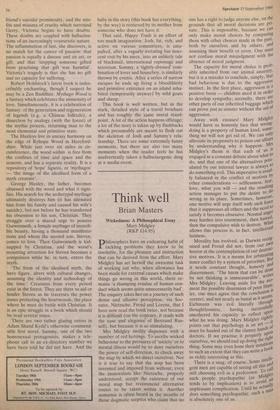Think well
Brian Masters
Wickedness: A Philosophical Essay Mary Midgley (RKP £14.95)
Dhilosophers have an endearing habit of I tackling problems they know to be insoluble, for the pleasure and instruction that can he derived from the effort. Mary Midgley has set herself the awesome task of working out why, when allowance has been made for external causes which make things go wrong in this world, there re- mains 'a thumping residue of human con- duct which seems quite unnecessarily bad'. The enquiry takes her on a journey of such dense and allusive perception, via Soc- rates, Nietzsche, Freud and Lorenz, that I have now read the book twice, not because it is difficult (on the contrary, it reads with the ease and elegance of Bertrand Rus- sell), but because it is so stimulating.
Mrs Midgley swiftly dispenses with a number of red herrings. To ascribe wicked behaviour to the pressures of 'society' or to mental illness would be to deny ourselves the power of self-direction, to chuck away the map by which we direct ourselves. Nor is it true to say that the map has been invented and imposed from without; even the immoralists like Nietzsche, properly understood, accept the existence of our moral map but recommend alternative routes to be taken within it. Another nonsense is often heard in the mouths of those dogmatic sceptics who claim that no
Spectator 15 September 1984 one has a right to judge anyone else, on the grounds that all moral decisions are pri- vate. This is impossible, because we can only make moral choices by comparing them with other choices made in the past, both by ourselves and by others, and assessing their benefit or error. One must not confuse moral misjudgment with the absence of moral judgment. The capacity for moral choice is prob- ably inherited from our animal ancestry, but it is a mistake to conclude, simply,
that bad behaviour is due to the aggressive instinct. In the first place, aggression is a positive boon — children need it in order to develop sympathy; secondly, there are other parts of our inherited baggage which can prove just as sinister without the aid of aggression.
Away with excuses! Mary Midgley would have us honestly face that wrong- doing is a property of human kind, some' thing we will not get rid of. We can only alleviate its propensity to poison our affairs by understanding why it happens. Mrs Midgley's thesis is that each of us 15 engaged in a constant debate about what to do, and that one of the alternatives post- ulated by our internal lawyer is always to do something evil. This imperative is usual- ly balanced in the conflict of motives by other considerations — selflessness, fear, love, what you will — and the resulting action manages to put the desire to do wrong in its place. Sometimes, however, one motive will urge itself with such force that it suppresses all others and the need to satisfy it becomes obsessive. Normal anger may harden into resentment, then hatred, then the compulsive wish to destroy. What, allows this process is, in fact, intellectual laziness.
Morality has evolved, as Darwin recog- nised and Freud did not, from our own horror at the contemplation of our destruc- tive motives. It is a means for arbitrating inner conflict by a system of priorities. 13111 it needs constant thought, honesty and discernment. 'The harm that can be done by not thinking is immeasurable', writes Mrs Midgley. Leaving aside for the mo- ment the possible dissension of poor Ham.: let, one mu:A agree that the conclusion Is correct, and not nearly as banal as it seem!' Eichmann was evil literally through thoughtlessness, having successfully smothered his capacity to reflect uP°.11 what he was doing. Mary Midgley rightly points out that psychology is an art its must be hauled out of the clumsy hands °I: doctors. If we practise it properly 1113°,, ourselves, we should end up doing the rigus` thing. Some may even hone their intuition to such richly ni interesting itahg as s h
that they this. can write a book
as There is a snag, of course.. Some intelli; gent men are capable of seeing all this and still choosing evil as a preference. To clan such people psychopathic (as Midg enY tends to by implication) is to avoid unpleasant complication. Until he actuala1.1 does something psychopathic, such a 111 is absolutely one of us.


















































 Previous page
Previous page